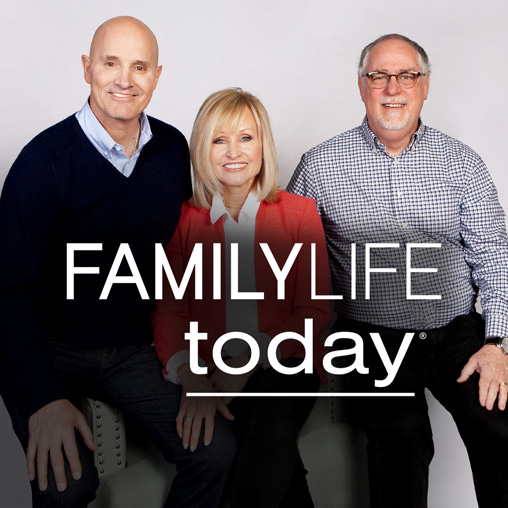
Hope When Things Seem Hopeless
How can we have hope when it seems like things can't possibly get any worse? On FamilyLife Today, join hosts Dave and Ann Wilson as they talk with author Vaneetha Risner about her painful diagnosis, her husband's rejection, and how God faithfully saw her and her family through it all.
Show Notes
About the Host
About the Guest
-
- Download FamilyLife's new app! https://www.familylife.com/app/
- Find resources from this podcast at https://shop.familylife.com/Products.aspx?categoryid=130.
- Check out all that's available on the FamilyLife Podcast Network. https://www.familylife.com/familylife-podcast-network/
-
Dave and Ann Wilson
Dave and Ann Wilson are hosts of FamilyLife Today®, FamilyLife’s nationally-syndicated radio program. Dave and Ann have been married for more than 38 years and have spent the last 33 teaching and mentoring couples and parents across the country. They have been featured speakers at FamilyLife’s Weekend to Remember® marriage getaway since 1993 and have also hosted their own marriage conferences across the country. Cofounders of Kensington Church—a national, multicampus church that hosts more than 14,000 visitors every weekend—the Wilsons are the creative force behind DVD teaching series Rock Your Marriage and The Survival Guide To Parenting, as well as authors of the recently released book Vertical Marriage (Zondervan, 2019). Dave is a graduate of the International School of Theology, where he received a Master of Divinity degree. A Ball State University Hall of Fame quarterback, Dave served the Detroit Lions as chaplain for 33 years. Ann attended the University of Kentucky. She has been active alongside Dave in ministry as a speaker, writer, small-group leader, and mentor to countless wives of professional athletes. The Wilsons live in the Detroit area. They have three grown sons, CJ, Austin, and Cody, three daughters-in-law, and a growing number of grandchildren.
-

Vaneetha Risner
Vaneetha Rendall Risner is a writer and speaker who is passionate about helping people find hope in their suffering. Her memoir, Walking Through Fire: A Memoir of Loss and Redemption as well as her devotional, The Scars That Have Shaped Me: How God Meets Us in Suffering both encourage readers to turn to Christ in their pain. Some of her greatest joys a...more
How can we have hope when it seems like things can’t possibly get any worse? Vaneetha Risner talks about her painful diagnosis, her husband’s rejection, and how God faithfully saw her and her family through it all.
Bob: When Vaneetha Risner found out that her husband had been unfaithful, and he said he might want out of their marriage, she had a lot of questions.
Vaneetha: “Why was I not enough?” probably went on. “How dare you,” went on. “How could you do this to me with all of my physical disability?” “How could you do this as a Christian?” “How can you do this to your children?”—all of those things—and “Is it worth it to walk away from an entire life?”
Bob: This is FamilyLife Today for Wednesday, March 3rd. Our hosts are Dave and Ann Wilson; I'm Bob Lepine. You can find us online at FamilyLifeToday.com. Among the questions Vaneetha Risner had to wrestle with, when she learned her husband had been unfaithful, was “God, how do I glorify You in the midst of all of this mess?” We’ll hear how all of those questions got resolved as we talk with Vaneetha today. Stay with us.
Bob: And welcome to FamilyLife Today. Thanks for joining us. Anybody who’s ever read the first chapter of Job knows how startling a story that is. First of all, Satan appearing before God, and asking for permission from God to afflict Job, and God granting permission. You go, “What’s going on there?”
Dave: Oh, yes; you do.
Bob: And then you see the affliction coming. It’s while one messenger is standing there, the next messenger comes and says “Oh, here’s more bad news,” “Oh, here’s more bad news,” and “Oh, here’s more bad news.” You get to the end of Job, Chapter 1; and you feel like this has got to be the most horrible story that’s ever happened to anybody.
Ann: It’s hard to read Job.
Bob: Yes.
Ann: It’s hard because of the suffering. I’ve struggled with it for years to read it.
Bob: We’ve been talking this week to somebody who—I know you [Vaneetha] would not—
Ann: Are you nicknaming her Job?
Bob: Well, we couldn’t do that.
Ann: What are you doing there? [Laughter]
Bob: Vaneetha Risner is joining us, again, on FamilyLife Today. Welcome back.
Vaneetha: Thank you.
Bob: You don’t think of yourself in terms like Job; because you read Job 1 and you go, “I’ve had affliction, but not like this man.”
Vaneetha: Yes.
Bob: I mean, he lost everything—all his kids, every—yes, it’s horrible; but with that said—
Dave: But yes; [Laughter] your affliction compared to others is pretty—
Ann: —significant.
Dave: Yes.
Bob: You were misdiagnosed as a baby, and the treatment led to polio in your life. You’ve been a quadriplegic throughout your life. You were in a body cast for a year.
Ann: How many surgeries?
Vaneetha: Twenty-one before I was thirteen.
Bob: You have then gone through miscarriages; and because, again of a misdiagnosis, the death of a son at seven weeks old. If that was the whole story, we would go, “This is more than most should have to deal with.”
Ann: I want to lay down and cry with you at this point; surely, there’s not more.
Bob: After the death of your son, Paul, your polio reemerged as an issue with what’s called—is it post-polio?
Vaneetha: Yes; post-polio syndrome.
Bob: What is that?
Vaneetha: I had never heard of it until I was diagnosed with it, or maybe I had and blocked it out; but basically, it happens to about 70 percent of the people who have polio. Basically, what happens is your muscles start to go backwards. All the—whatever limbs were affected by polio—which for me was all four limbs, both arms and both legs—they start to go back to where they were when you first got polio. For me, I was a quadriplegic. The doctors basically said, at that point, I needed to cut out everything I was doing; because the hardest thing about post-polio is: the more you do, the weaker you get.
They told me when I went in. I went in, because I had some pain in my arm. They said my energy and strength is like money in a bank. Every time I do something, I’m making a withdrawal; but I can’t make any deposits; so the more I do, the weaker I get. I used to be an artist; I did all kinds of things and they told me “Stop! Right now.” I remember saying to them “What happens if I don’t stop? What happens if I just keep doing the things I’m doing?” This woman looked at me and she said, “In ten years, someone will be feeding you.” I was 38 then; and I thought—and I had two young kids—"I can’t have somebody feeding me in ten years,” or “If I can, obviously, God will give me the grace for that”; but I radically have to change my life in terms of the things I was doing.
That was a change in identity for me. I feel like I was a helper—I liked to do things for people—I would take meals. All of a sudden, that wasn’t me anymore; I couldn’t take meals. I really couldn’t help people, physically, in any way. I really needed help from people. That was really going to the Lord and saying “Okay, help me reframe who I am.” They told me I needed to start using a wheelchair; I had never used a wheelchair before that. When they said that, that felt like failure to me, at first; because my parents had worked so hard that I wouldn’t be in a wheelchair.
It just reframed everything for me. I had to view the adaptive devices that I had as blessings, and that took a while. But I knew, if I didn’t have a wheelchair to use, then maybe I wouldn’t even be able to get around. When you need something, it is a way of looking at things differently.
Joel is amazing—my husband—because he does so much for me to make sure that I don’t overuse my muscles; he’s like, “If I can do it, ask me to do it.”
Bob: Anybody who has been following your story, as we’ve talked about it this week, just heard you mention Joel, your husband; but we’ve talked earlier about Dave, your husband.
Vaneetha: Yes.
Bob: That’s another part of your story. You met Dave in graduate school at Stanford.
Vaneetha: Yes.
Bob: He knew you had physical limitations when he married you.
Vaneetha: Yes.
Bob: That was not a barrier or an obstacle for him. Along the way, your marriage—you started to recognize there were cracks in the foundation.
Vaneetha: Yes; six years after my post-polio diagnosis, when I was just trying to figure life out, Dave came home and said he had met someone else; he left. I had two daughters, Katie and Kristi—they were nine and almost thirteen at the time—and our world fell apart.
Dave ended up moving to another state, where his company was. My life just hit rock bottom, to be honest. I didn’t know how I was going to make it; because I was a single mom with post-polio, struggling with lots of pain—because post-polio, actually, is fairly painful as well—and two kids, who don’t drive, who are angry because their world had fallen apart. We were sort of the perfect little church couple; and life, as I knew it, just unraveled.
Dave: The perfect little church couple—
Vaneetha: Yes.
Dave: —what happened? I mean, there had to be signs before he said, “I’m out of here”; or did you not see anything?
Vaneetha: I didn’t. I know a lot of people say, “How could you not have seen it?” We were growing distant; I knew that, but I kept thinking, “Oh, it’s just distance; we’re fine.”
Bob: When your husband says to you, “I’ve met somebody else,” what goes on in your soul?
Vaneetha: “Why was I not enough?” probably went on. “How dare you,” went on. “How could you do this to me with all of my physical disability?” “How could you do this as a Christian?” “How can you do this to your children?”—all of those things—and “Is it worth it to walk away from an entire life?”
Bob: Did you confront him with those kinds of questions?
Vaneetha: I did; and his response was: “I don’t know; I don’t have answers to all of those things.” We went back and forth, honestly, for a few years after he left, just trying to decide what we were going to do. Those were hard, hard years for me, just trying to figure out: “What is God calling me to do here?”—because I wanted to be faithful to God and say, “God, I’ll do whatever You call me to do,”—knowing what that was took me a long time.
Bob: You’re trying to figure out how to survive in a country, where you don’t know how to live.
Vaneetha: That is exactly right. It’s funny that you used that terminology; because I remember one time—this was a few years after he left—and just saying, “God, are we going to get back together? What am I supposed to do here?”
I read Jeremiah 29—not the “I know the plans I have for you,” which is a wonderful passage—but before that when Jeremiah says, “You need to live in this new country,”—like plant gardens; get married—like: “This is where you’re living.”
Ann: “This is your new home.”
Vaneetha: Yes; for me, the Lord was like: “Plant gardens. This is your home right now,”—like: “Don’t be looking to: ‘If this changes, this is what I’m going to do…’”—but: “How am I going to live here now?” That really helped me say “Okay; I’ve got to assume we’re going to be here, and I need to form my life.”
I feel like my life was on hold, just thinking, “Oh, we’re going to get back together; we’re going to be this happy family. It’s going to be fine,”—and realizing it may or may not happen—but I need to live in this new country.
Ann: Did you have that attitude after you had written your husband’s mistress a letter?
Vaneetha: I had that attitude after; yes.
Ann: What did that letter say? Are you still fighting for your marriage?
Dave: Honey, that’s a little personal. [Laughter] I mean, you’re digging in here.
Ann: I’m going, woman to woman; like I would have written a letter too.
Vaneetha: Well, it was funny that you mention that, Ann. I wrote her a letter. For people to know, it was not my idea; it was really from a book, Crazy Love, by Francis Chan. I read a quote that I felt like God was using to talk to me to say, “Write her a letter.” Honestly, I said, out loud, “Are You asking me to do that? That seems crazy.” I remember saying it, going to bed, thinking, “This is not something that I am signing up for; so ask somebody else.”
Ann: Sounds like crazy love; doesn’t it?
Vaneetha: Yes, it does! [Laughter] Exactly. That’s why I was perfect for that. I just got up in the middle of the night, finally—could not sleep. I wanted to write one kind of a letter, but God did not want that kind of a letter written. It was a letter just sharing with her the gospel, saying, “God has done so much for me, and I feel called to write that to you.”
The most amazing thing was God changed me. I sent the letter, thinking, “Okay; God is going to use this to bring my husband back.” There was going to be a bow on that story, but there was not a bow; and he didn’t come back. I didn’t really hear from her about the letter; I knew she had gotten it, but God changed me. I was praying for her, because I had written to her what it meant to know Christ and how that radically changes you.
I just started praying for her every day. It’s hard to pray for someone every day and to be really angry at them. God just started to melt away all of these feelings of resentment and anger, really, way before we had even decided where we were going—my ex-husband and I—I was still wondering if he was going to come back; and yet, I was not angry at her.
Dave: Hearing that is so supernatural. Because in your book, and I found this interesting, you say the unfaithfulness of your husband was harder and more hurtful than all the pain that you had gone through—losing a child/your polio—that’s how deep that pain was; anybody, that’s experienced that, knows that. And then/yet, you get to a place, where you’re a blessing to a woman that doesn’t deserve it. That’s supernatural; that can’t be done in your own strength.
Bob: What did Dave say to the girls/to his daughters? What did you say to your daughters about what Daddy was doing?
Vaneetha: Dave told them he was super confused about what was going on in his life and didn’t really have a lot of answers for them. I just told them to pray. I was saying, before that, I wish I had talked to them a little bit more about my own pain; because I just sort of put up a wall about my own pain and just listened to them or tried to talk to them. But we did say a lot that: “God is going to use this.”
I remember Laura Story’s song, Blessings, was out around that time, and just saying, “We don’t know how God is going to use this in our life, but we’re going to trust that God is going to use it for good.” But it was hard; because the girls would pray every night for a long time: “Bring Daddy back.” That’s gut wrenching when you hear your daughters pray something, and you’re praying it, too; and then God says, “No.”
Bob: There was a day when Dave came back?
Vaneetha: Yes; he wanted to reconcile for a while; we went back and forth. I think he genuinely wanted that; but at the same time, I felt like he—at the time, I felt like he wasn’t willing to let go of everything—and I really needed a lot of proof: like, “I need to see repentance; I need to see these things,” and I didn’t see them. I really went to God with that and said, “You tell me what to do.” I felt really clear that God was like: “You don’t need to do this, because you think this is what a good Christian woman would do.”
Honestly, that was part of my view—was: “I need to stay in this, because Christian women stay in marriages no matter what.” And I felt like God gave me the freedom to say: “What is right here? Where have you [Vaneetha] been wronged?” and “What are the lines you can draw?” It took a lot of courage, honestly, for me to just draw the line and say, “If I don’t see this, and this, and this, then I can’t take you back.”
Ann: It was complicated, because the other woman was pregnant with his child.
Vaneetha: Yes, she was; no matter what happened in this situation, it wasn’t going to be pretty.
Bob: I just want to step in here; because I want to commend your thinking and your processing before the Lord. The most loving thing you can do for someone, in a situation like you were in, is not necessarily to say, “Welcome back home,” but to say, “I want to be an ally in dealing with the sin patterns in your life that have emerged and have become clear, and so there are boundaries here for your good—not just because you have to jump over hoops in order to earn the privilege of moving back in with me—but because you need to be a different person before the Lord for this to work.”
Ann: Bob, some people are going to hear you and think, “What? Wait; you’re supposed to be pro-marriage.”
Bob: And I am pro-marriage; and I’m saying to put these kinds of restrictions in place is the most loving thing you can be doing for this spouse, who is breaking the covenant/who is not loving you well, to say, “I want you to be the husband and the man God has called you to be; therefore, I’m going to say, ‘Until you’re ready to really deal with this stuff, we’re keeping this up,’” maybe as a motivation for your husband to finally deal with this stuff.
Vaneetha: That’s exactly what I felt like the Lord was saying—is: “If it’s too easy, then there doesn’t need to be real repentance.” Somebody doesn’t need to go to God, because we can do a lot in our own strength; but to really change, we can’t do that without Jesus.
Bob: And this was not you saying: “You’ve got to do this to prove to me this…” or “To work, you’ve got to jump through these hoops.” This is you saying, “This is the man God says you need to be, so I want to be your ally in helping you be that man.” Did Dave respond to that at all?
Vaneetha: I think he tried; he wanted to, but he wasn’t able to. I remember our pastor—I got our church really involved in terms of our pastor—because I felt like I needed counsel.
Ann: That’s super wise.
Vaneetha: I could not go through this alone, and I needed wisdom. I had a counselor/a Christian counselor as well.
I remember one thing that Tom, our pastor, said is: “Repentance has fruit. We need to see that God is really doing a work.” I don’t want to say that God has not changed him, because he is a believer—I do see that there is change in his life—but I didn’t feel like God was calling me back into that marriage and didn’t really see the fruit that I felt I needed to see.
Dave: Were there ever moments of weakness, where—I mean, it sounds right now, like you were strong the whole time through—but I’m just asking, “Was there an evening, where, “You know what? I could lower the bar/bring him home. It would be better for the girls.” Or were you pretty forthright through the whole thing?
Vaneetha: I’m like jealous—no, I was not strong through the whole thing—I was so torn; because I loved our family, and so it was hard. I wanted us back together again. There were a lot of times, where I would say, “I want this.” I would call my pastor or my sister and say, “Help me process this,” because I think we can’t sometimes process those things ourselves. I would go to the Bible; I would journal; I would call people—because there were times when I thought that would be easier—and yet, inside, I knew that wasn’t what God wanted. That wasn’t the highest that God had for me.
Dave: It is so critical what you’re saying. There’s a listener listening, right now, that’s wrestling with something. They might be thinking, “I can do this on my own.” They can’t; you can’t—you need the body of Christ—that’s what the body of Christ can do. You need a friend or two to give you wise counseling—you modeled that.
I just want to advocate for anybody right now: “Make that phone call. You need help.”
Vaneetha: Yes.
Bob: I’ve always—in talking with people, who have said, “Do you think I have biblical grounds for divorce in this situation?”—I have said— “Do the elders in your church think you have biblical grounds? Have they walked through this? Do they know the inside of your story?”
This is not: “Do I meet the criteria? Can I check this box off that gives me the grounds?” This is people, walking the journey with you, who are stepping in and saying, “You have the right motivation. You’re doing this right before the Lord, with the right reasons and the appropriate circumstances.”
Here’s what I’ve said/I’ve said, “That’s not your call to make. That is the spiritual people around you/the godly counselors around you speaking into your life. I’m not saying that you don’t have a voice in this. I’m just saying you don’t make this determination about what steps you should be taking to try to heal a broken marriage on your own. This is what the body of Christ is for.”
Ann: I think our feelings run so high. I know, when I’m trying to make a decision, and I’m hearing from God, I’m trusting what I’m hearing—but because my emotions are running so high in those matters—it is always good to get wise counsel.
Vaneetha: Oh, I totally agree. It was actually neat; because our pastor came to me one day, and he said, “I want you to know you have the full support of everybody on the elder board if you want to file for divorce.” I ended up not being the one who filed; Dave ended up being the one who filed; but at the same time, I didn’t want to do anything that wasn’t in accordance with what God had for me.
I knew I had biblical grounds, but that doesn’t necessarily mean that that’s what God is calling you to do. You really need to seek the Lord on it. That was a really good process for me—not to just go with my first reaction—but to really get wise counsel and hear from God through the Word. I’m very thankful I was able to go through it that way.
Bob: I know telling this story here/telling this story in your book, you had to have a lot of prayer, just to say, “I’m going to write a book and share all of this.”
Vaneetha: Yes.
Bob: Your girls are still living all of this; your ex-husband is still living all of this. Why did you decide to tell this story as publicly as you’ve told it?
Vaneetha: I decided because I wanted people to see sort of the inner workings of someone, who has failed; and yet, loved God through it; and what it looks like to authentically walk through suffering. Because I feel like there’s a lot of Christians that have a: “It’s all good,” sort of veneer over everything that they say. You don’t really have practical help when you’re in the midst of the trenches—like: “My child has died,” “I’ve got a debilitating disease,” “I’m walking through a separation or divorce,”—like, “How do I/what do I do?”
In the book, I really try to show what I did poorly, and what I wish I had done differently, and what God guided me to do well, and what God showed me and the things I learned. It’s really hard to do that in a book that’s sort of about doctrine; whereas, a memoir, there’s a way to—it’s sort of a narrative theology—like I can teach you things out of the Bible, and things that I’ve learned, and the ways God has been faithful, and invite you into the journey with me.
Dave: It’s a beautiful theology of suffering in a narrative form; you’re right. It’s so readable, and it models a biblical viewpoint of how to suffer well.
Bob: In fact, we want to make your book available, Vaneetha, to FamilyLife Today listeners, who are going through whatever challenges they may be going through—whether it’s health related, as you write about in the book; or whether it’s the loss of a child, or a marriage that takes a turn—you have lived through these things; you have processed these things biblically. You’ve written about them in your book, Walking Through Fire.
We’re making that book available to any FamilyLife Today listener, who can make a donation to help support the ongoing work of this ministry. Your support of FamilyLife® makes this kind of conversation happen; and you help us distribute it to more people, more often, through your financial support. That’s what you’re investing in—the lives, the marriages, the families of hundreds of thousands of people every day, who are receiving practical biblical help and hope for their marriage and their family through the ministry of FamilyLife Today.
Thank you for your support, whether you’re a monthly Legacy Partner or you make a one-time donation today to help with the ongoing work of this ministry. Be sure to ask for your copy of Vaneetha Risner’s book, Waking Through Fire, when you get in touch with us. You can donate, online, at FamilyLifeToday.com; or if it’s easier, call us at 1-800-FL-TODAY; 1-800-358-6329; that’s 1-800-“F” as in family, “L” as in life, and then the word, “TODAY.” Again, when you make your donation, be sure to ask for your copy of the book, Walking Through Fire, by Vaneetha Risner.
Now, tomorrow, we’re going to get to a part of your story that—well, it’s the happy part of your story. I was going to say it’s the Hallmark® Channel part of your story, but there’s no Hallmark movie that rivals the story you’re going to share with us tomorrow. I hope our listeners can tune in for a remarkable love story tomorrow.
I want to thank our engineer today, Keith Lynch, along with some help today from Bruce Goff, and our entire broadcast production team. On behalf of our hosts, Dave and Ann Wilson, I’m Bob Lepine. Thanks for joining us. Hope to see you back tomorrow for another edition of FamilyLife Today.
FamilyLife Today is a production of FamilyLife of Little Rock, Arkansas; a Cru® Ministry. Help for today. Hope for tomorrow.
We are so happy to provide these transcripts to you. However, there is a cost to produce them for our website. If you’ve benefited from the broadcast transcripts, would you consider donating today to help defray the costs?
Copyright © 2021 FamilyLife. All rights reserved.
1




